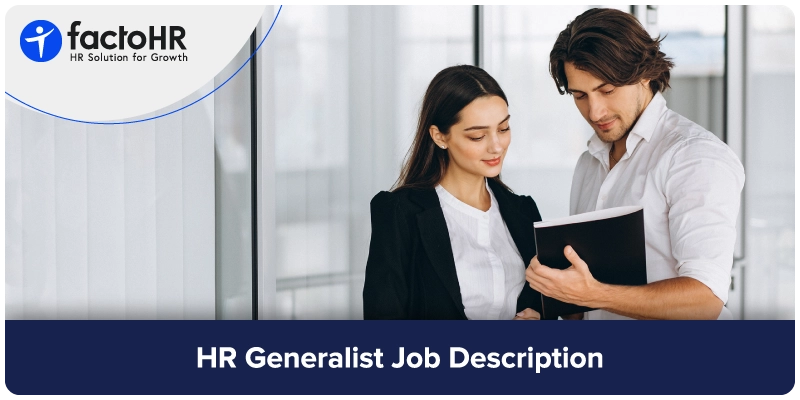HR Generalist Job Description Template

Free AI Job Description Generator
Create your perfect job description for any role in seconds.
Table of Contents
An HR Generalist is responsible for overseeing various HR functions, including hiring new people, handling employee issues, managing salaries and benefits, making sure laws and regulations are followed, and organizing training programs. They help create a positive work environment and ensure that HR policies support the company’s objectives.

HR Generalist Job Description Template
About Us
[Company Name] is a fast-growing company in the [industry/sector]. We focus on people, promote new ideas, and always put our customers first. With a strong presence in [markets/regions], we provide [products/services] that benefit our clients. Our team of over [X] professionals works hard to create a friendly workplace, build strong employee connections, and grow the business through teamwork and continuous improvement.
Job Title: [Insert the exact job title you are hiring for, e.g., HR Generalist]
Employment Type: [Full-time/Part-time/Contract]
Location: [Mention city/remote/hybrid option.]
Job Summary
[Write a summary in 2–3 lines describing the purpose of the role and how it adds value to the organization.]
HR Generalist Responsibilities
- [Responsibility 1]
- [Responsibility 2]
- [Responsibility 3]
Qualifications
[List the educational background or certifications required. Example: Bachelor’s/Master’s degree in a relevant field.]
Skills and Abilities
- [Skill 1 – highlight technical or soft skills]
- [Skill 2]
- [Skill 3]
Experience: [Insert years of experience required and type of industry/domain exposure preferred.]
Working Hours: [State standard office hours or flexibility options.]
Salary and Benefits
- [Competitive salary/mention perks like PF, bonuses, health insurance]
- [Growth opportunities or career development programs]
Application Instructions
[Guide candidates clearly: “Apply by sending your CV to [email/ATS link] with subject line: Application for [Job Title]”.]
HR Generalist Job Description Sample
About Us
Xing Pharma is a fast-growing pharmaceutical company that values its workforce as its greatest strength. We aim to create a supportive work environment where employees can learn, grow, and build a successful career. Our focus is on working together, being creative, and caring for people to achieve the best results for both our clients and our team.
Job Title: HR Generalist
Employment Type: Full-time on-site
Location: Hyderabad
Job Summary
HR Generalist at Xing Pharma will be responsible for managing daily HR activities like hiring, employee support, and performance management. They will help ensure smooth HR operations and contribute to maintaining a positive workplace environment.
HR Generalist Responsibilities
- Handle the recruitment process, from posting jobs to interviews and onboarding.
- Address employee concerns, help resolve conflicts, and encourage a positive workplace.
- Ensure the company adheres to labor laws, regulations, and company policies.
- Develop and update HR policies and procedures to support the company’s goals.
- Manage salaries, payroll, and employee benefits.
- Organize training and skill development for employees.
- Track leave, attendance, and ensure workplace safety.
- Assist with HR reports, workforce planning, and data analysis.
- Collaborate with managers to enhance employee satisfaction and minimize turnover.
Qualifications
- Degree in business, HR, or a relevant field.
- HR certifications like SHRM-CP or PHR are advantageous.
Skills and Abilities
- Expert in labor regulations, HR policies, and compliance rules.
- Experienced in using HR tools, including payroll systems and ATS.
- Proficient in communication and problem-solving.
- Ability to prioritize work and keep information confidential.
- Understanding of HR procedures and policies.
- Professional and customer-focused attitude with respect for privacy.
- Skilled in Microsoft Office applications (Word, Excel, PowerPoint)
- Willingness to work well in a team and focus on achieving results.
Experience: 5+ years of experience in HR or similar roles.
Working Hours: 10:00 AM to 7:00 PM – Monday to Friday (5 Days Working)
Salary and Benefits
- Competitive pay based on experience
- Health insurance coverage
- Paid time off and holidays
- Retirement savings plan
- Opportunities for training and growth
Application Instructions
Apply by sending your CV to hr@Xingpharma.com with the subject line: Application for HR Generalist.

How Can You Become an HR Generalist?
Becoming an HR Generalist involves gaining a combination of education, skills, and experience in human resources functions. Here’s a step-by-step guide on how to become an HR Generalist:
Get a Bachelor’s Degree in HR
Complete a bachelor’s degree in human resources or a related subject. This will provide a basic understanding of HR work, employment laws, and business practices.
Earn HR Certifications
Obtaining a certification like CHRMP (Certified Human Resource Management Professional) can strengthen a resume. It offers training in HR rules and practices, which helps boost performance as an HR Generalist.
Gain Work Experience
Start with a trainee or assistant HR job or internship to learn skills and gain practical experience. This helps in understanding how HR works in real companies.
Grow Your Career
Studying a master’s degree in human resources or a related field can help advance a career. When combined with gaining practical experience, it leads to opportunities for higher-level leadership roles.
Skills Required for HR Generalists
- Excellent Communication
- HR policy and labor law knowledge
- Organizational and problem-solving skills
- Proficient in using HR software solutions and data management systems
- Ability to adapt and think creatively to improve systems
Apply for HR Generalist Positions
With HR experience from an internship or entry-level role and a basic understanding of core HR functions, start applying for positions like:
- HR Executive
- HR Generalist
- HR Coordinator (with broader responsibilities)
Difference Between HR Manager and HR Generalist
The following table provides a clear difference between an HR Manager and an HR Generalist:
| Aspect | HR Manager | HR Generalist |
|---|---|---|
| Role Focus | Focuses on planning and managing HR strategy for the company | Handles daily HR tasks and operations |
| Responsibilities | Leads the HR team, sets policies, and manages big HR projects | Manages recruitment, training, employee records, and benefits |
| Nature of Work | Strategic and leadership role | Operational and hands-on role |
| Decision Making | Makes important decisions about HR policies and business alignment | Supports by carrying out HR tasks and reporting issues |
| Skills Needed | Leadership, planning, and budgeting | Communication, multitasking, and administrative skills |
| Experience | Usually requires more experience and sometimes a higher degree | Typically, entry to mid-level experience |
| Interaction | Works with company leaders and managers | Works directly with employees and the HR team |
What does a Day in an HR Generalist Job Look like?
A day as an HR Generalist includes many different tasks like paperwork, helping employees, hiring new people, and making sure company rules are followed. The job involves handling questions, managing performance, organizing recruitment, and benefits, often being the contact for employees and managers.
Morning
- Check Emails: Answer employee questions about salary, leaves, benefits, or workplace concerns.
- Review Resumes: Go through job applications and plan interview schedules with hiring managers.
- Interview Candidates: Talk to job applicants over the phone or conduct in-person interviews to see if they are a good fit for the company.
Midday
- Onboard New Employees: Prepare contracts, explain rules and policies, and help new hires settle in with training.
- Update Records: Ensure employee details, job roles, and attendance are kept up to date in the HR system.
- Guide Managers: Support supervisors with performance management, advise them on how to handle employee issues or disciplinary actions.
Afternoon
- Handling Employee Relations: Solve workplace conflicts or complaints and work towards fair resolutions.
- Ensuring Compliance: Review the company’s policies to make sure they meet labor laws and company standards.
- Organizing Training: Coordinate employee development programs, workshops, or training sessions.
- Reporting and Analysis: Prepare reports on HR metrics, like recruitment progress, turnover rates, and employee satisfaction with management.
End of Day
- Plan Ahead: Schedule tasks for the next day, such as interviews, employee training, and internal meetings.
- Team Discussions: Meet with other HR team members to share updates, solve challenges, and improve processes.
These activities show the HR Generalist roles and responsibilities as well as how they manage multiple tasks throughout the day.

Conclusion
An HR Generalist manages a broad range of employee-related functions within an organization. Their role is dynamic, as they help build a positive work culture, support hiring and retaining the right employees, and ensure the company follows the law.
What is an HR Generalist?
An HR Generalist is a versatile professional responsible for a wide range of human resources functions within an organization, including recruitment, employee relations, benefits administration, and training.
What are the Roles and Responsibilities of HR Generalist?
The roles and responsibilities of HR Generalist include managing recruitment and onboarding, handling employee relations, implementing HR policies, maintaining employee records, supporting payroll and compliance, and ensuring smooth HR operations within the company.
What does an HR Generalist do?
An HR Generalist handles a variety of human resources tasks to keep the HR department operating efficiently. They support both employees and the company by ensuring HR policies are followed and employees have the help they need.
Get Your Free, Ready-To-Use Job Description Templates Here:
© 2026 Copyright factoHR



